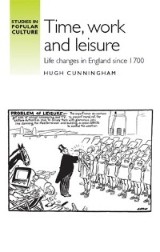Details

Time, work and leisure
Life changes in England since 1700Studies in Popular Culture
|
22,99 € |
|
| Verlag: | Manchester University Press |
| Format: | EPUB |
| Veröffentl.: | 16.05.2016 |
| ISBN/EAN: | 9781526112286 |
| Sprache: | englisch |
| Anzahl Seiten: | 240 |
DRM-geschütztes eBook, Sie benötigen z.B. Adobe Digital Editions und eine Adobe ID zum Lesen.
Beschreibungen
<p>This book traces the history of the relationship between work and leisure, from the ‘leisure preference’ of male workers in the eighteenth century, through the increase in working hours in the later eighteenth and early nineteenth centuries, to their progressive decline from 1830 to 1970. It examines how trade union action was critical in achieving the decline; how class structured the experience of leisure; how male identity was shaped by both work and leisure; how, in a society that placed high value on work, a ‘leisured class’ was nevertheless at the apex of political and social power – until it became thought of as ‘the idle rich’. Coinciding with the decline in working hours, two further tranches of time were marked out as properly without work: childhood and retirement. <br><br>Accessible, wide-ranging and occasionally polemical, this book provides the first history of how we have imagined and used time.</p>
Explores the major changes in our use of and attitude to time over three centuries. Asks why the 1960s and 1970s expectation that leisure time would increase has failed to come about
<p>1. Introduction<br>2. Time and society in the eighteenth century<br>3. Leisure preference and its critics, 1700–1850<br>4. Leisure and class, 1750–1850<br>5. Work time in decline, 1830–1970<br>6. Men, work and leisure, 1850–1970<br>7. The leisured class, 1840–1970<br>8. Towards ‘work-life balance’<br>Conclusion<br>Select bibliography<br>Index</p>
Hugh Cunningham is Emeritus Professor of Social History at the University of Kent
<p>In the 1960s and 1970s it was argued that leisure time would increase at a rapid rate. This prophecy has turned out to be false, and time is now equated with achieving a ‘work-life balance’ where ‘life’ is often unpaid childcare and domestic work. <br><br>This book traces the history of the relationship between work and leisure, from the ‘leisure preference’ of male workers in the eighteenth century, through the increase in working hours in the later eighteenth and early nineteenth centuries, to their progressive decline from 1830 to 1970. It examines how trade union action was critical in achieving the decline, how class structured the experience of leisure, how male identity was shaped by both work and leisure, and how, in a society that placed high value on work, a ‘leisured class’ was nevertheless at the apex of political and social power – until it became thought of as ‘the idle rich’. Two further tranches of time came to be marked out as properly without work: childhood and retirement. <br><br>By the mid-twentieth century, married men had achieved a work-leisure balance. This was far from the case for married women. The book shows how their entry into the labour market in the later twentieth century sparked new thinking about work and time, coinciding with a halt to the decline in working hours, and a reversal of the trend in some sectors of the economy. <br><br>Accessible, wide-ranging and occasionally polemical, this book provides the first history of how we have imagined and used time.</p>
Diese Produkte könnten Sie auch interessieren:

Der Deutsch - Französische Krieg 1870 / 71: Die Gründung des Deutschen Reiches

von: Rainer Smolcic

4,99 €















